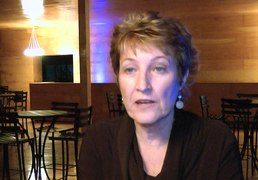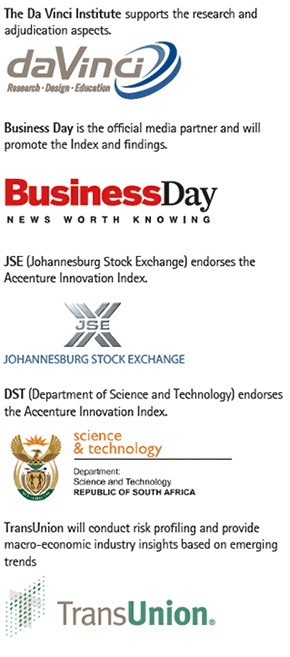Lack of financing can stonewall great ideas
by Staff Writer,
2013-11-28 12:09:39.0
SMALL businesses surprised the adjudicators at the inaugural Accenture Innovation Index and Awards with their ability to overcome economic challenges and bring groundbreaking ideas to market.
In the end, 190 entries from a range of companies were received, but after a tough adjudication process four of the top seven were small businesses.
This result flies in the face of arguments that small businesses can’t make it in South Africa, but it also highlights how many more jobs could be created if more small businesses get a break and receive the financing needed to take that crucial first step.
CEO of credit bureau TransUnion Africa, Geoff Miller, says while there are a lot of great ideas around, there is not enough financing to make sure they are turned into reality. "Small business is challenged," he says. "More practical solutions are needed."
Taking a leaf out of the Accenture winners’ books, TransUnion is coming up with some innovative ways to help improve the situation for entrepreneurs and small businesses. TransUnion manages credit information on both consumers and businesses and maintains data on more than 17-million consumers and 3.3-million businesses in South Africa. It aims to help businesses better manage risk and relationships throughout the customer credit life cycle. The best idea can become a dead duck if the bad credit records of consumers trump sales or the ability to raise funding to start a business.
One of the answers is Mobile Solutions, which enables clients to reply immediately to a consumer’s credit application with a message to his or her cellphone. This can improve back-office efficiency and turnaround times for customers and their own operations.
According to Miller, what underpins financial lending is robust information on the entities trying to borrow, but unfortunately because of some poor data policies, banks are not able to make efficient lending decisions.
TransUnion, a key partner in the Accenture Innovation Index, is trying to change this by bringing more automation and quality data to market to help lenders make decisions that will benefit innovative small businesses.
Miller says the country is in a period of stress as overall consumer credit health has been falling for two-and-a-half years and is almost back to 2008 credit crisis levels. "It will take time for this to wear off and a sluggish economy is not helping the situation."
Credit bureau statistics show more than 2.7-million consumers have judgments or administration orders against their names.
The government has agreed to a limited credit amnesty to delete adverse credit information on consumer’s profiles. Will this help smaller businesses? According to Miller, there is a bit of misunderstanding around what the credit amnesty is.
"The obligation to repay debt has not been eliminated, but only removed from the credit report — they still owe the money," he says.
He believes there may have been better ways to improve the credit picture than the credit amnesty. He is joined by a chorus of discontent from business groups and banks.
According to National Debt Mediation Association CEO Magauta Mphahlele a more permanent structured solution in legislation is needed as direct negotiation with creditors does not assist consumers, as they still have to deal with the competing demands of credit providers and, due to a lack of knowledge, have no bargaining power.
Miller says while banks remain cautious, one thing he has noticed in the rest of Africa is unsecured lending is not as robust as in South Africa.
"A lot of developing countries are plugging in infrastructure, so expect it to be a robust market for the next five years plus," he says.

Picture: THINKSTOCK
SMALL businesses surprised the adjudicators at the inaugural Accenture Innovation Index and Awards with their ability to overcome economic challenges and bring groundbreaking ideas to market.
In the end, 190 entries from a range of companies were received, but after a tough adjudication process four of the top seven were small businesses.
This result flies in the face of arguments that small businesses can’t make it in South Africa, but it also highlights how many more jobs could be created if more small businesses get a break and receive the financing needed to take that crucial first step.
CEO of credit bureau TransUnion Africa, Geoff Miller, says while there are a lot of great ideas around, there is not enough financing to make sure they are turned into reality. "Small business is challenged," he says. "More practical solutions are needed."
Taking a leaf out of the Accenture winners’ books, TransUnion is coming up with some innovative ways to help improve the situation for entrepreneurs and small businesses. TransUnion manages credit information on both consumers and businesses and maintains data on more than 17-million consumers and 3.3-million businesses in South Africa. It aims to help businesses better manage risk and relationships throughout the customer credit life cycle. The best idea can become a dead duck if the bad credit records of consumers trump sales or the ability to raise funding to start a business.
One of the answers is Mobile Solutions, which enables clients to reply immediately to a consumer’s credit application with a message to his or her cellphone. This can improve back-office efficiency and turnaround times for customers and their own operations.
According to Miller, what underpins financial lending is robust information on the entities trying to borrow, but unfortunately because of some poor data policies, banks are not able to make efficient lending decisions.
TransUnion, a key partner in the Accenture Innovation Index, is trying to change this by bringing more automation and quality data to market to help lenders make decisions that will benefit innovative small businesses.
Miller says the country is in a period of stress as overall consumer credit health has been falling for two-and-a-half years and is almost back to 2008 credit crisis levels. "It will take time for this to wear off and a sluggish economy is not helping the situation."
Credit bureau statistics show more than 2.7-million consumers have judgments or administration orders against their names.
The government has agreed to a limited credit amnesty to delete adverse credit information on consumer’s profiles. Will this help smaller businesses? According to Miller, there is a bit of misunderstanding around what the credit amnesty is.
"The obligation to repay debt has not been eliminated, but only removed from the credit report — they still owe the money," he says.
He believes there may have been better ways to improve the credit picture than the credit amnesty. He is joined by a chorus of discontent from business groups and banks.
According to National Debt Mediation Association CEO Magauta Mphahlele a more permanent structured solution in legislation is needed as direct negotiation with creditors does not assist consumers, as they still have to deal with the competing demands of credit providers and, due to a lack of knowledge, have no bargaining power.
Miller says while banks remain cautious, one thing he has noticed in the rest of Africa is unsecured lending is not as robust as in South Africa.
"A lot of developing countries are plugging in infrastructure, so expect it to be a robust market for the next five years plus," he says.






















Change: -1.52%
Change: -1.70%
Change: -1.84%
Change: -1.60%
Change: -1.52%
Data supplied by Profile Data
Change: -0.64%
Change: 0.12%
Change: -1.52%
Change: 0.00%
Change: 0.10%
Data supplied by Profile Data
Change: 0.73%
Change: -0.11%
Change: 0.63%
Change: 1.18%
Change: 1.40%
Data supplied by Profile Data
Change: 0.72%
Change: 0.71%
Change: -0.13%
Change: 0.33%
Change: -0.15%
Data supplied by Profile Data